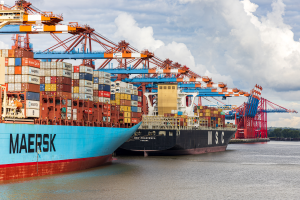S&P 500: 0.34% DOW: 0.34% NASDAQ: -0.38% 10-YR Yield: 4.21%

Last Week on Wall Street - March 30th, 2024
What Happened?
The first quarter of the year brought significant optimism to the stock market, resulting in the best Q1 performance in five years. The S&P 500 surged by more than 10% by the end of Thursday, the final trading day of the quarter, marking an impressive start reminiscent of 2019. This bullish trend was driven by a combination of factors, including the artificial intelligence boom, record corporate profits, and growing optimism regarding the easing of inflation. Contributing to the positive economic landscape, recent reports from the Bureau of Economic Analysis highlighted growth in crucial areas such as GDP and consumer spending for Q4 of the previous year. Additionally, the recovery in home sales from a January decline, a decrease in jobless claims, and an uplift in advertisers' forecasts have further bolstered market sentiment, with consumer confidence reaching its highest point since 2021.
Beneath the surface, the Utilities Sector rallied by 3.0%, signaling a continued recovery, followed by gains in Energy (+2.0%) and Health Care(+1.4%). Technology (-0.75%) and Communications (-0.24%) experienced declines this week, following a huge rally this quarter.
Key Fed Inflation Gauge Rose 2.8% Annually, in February
- The personal consumption expenditures price index excluding food and energy increased 2.8% on a 12-month basis and was up 0.3% from a month ago.
- Core PCE was up 0.3% for the month and 2.5% at the 12-month rate, compared to estimates for 0.4% and 2.5%.
The key takeaway - In February, the Personal Consumption Expenditures (PCE) price index, excluding food and energy, showed a 2.8% year-over-year increase and a 0.3% increase for the month, aligning with forecasts. The inclusion of volatile food and energy costs resulted in a similar monthly increase, underscoring the Federal Reserve's focus on core PCE as a gauge of long-term inflation, which has exceeded its 2% target for the past three years.
Recent data suggest that the sustained inflationary trend is unlikely to surprise the Federal Reserve or market analysts, with a shift in focus towards labor market conditions anticipated. Rising consumer spending and subtle changes in personal income highlight persistent inflation pressures. With the Federal Reserve signaling possible future rate adjustments, markets are closely monitoring for any policy changes, especially with anticipated rate cuts beginning in June.
The Economic Implications of the Baltimore Bridge Collapse
- The containership crash that downed a Baltimore bridge Tuesday stands to snarl shipping along the East Coast for months.
- Officials say the bridge collapse could affect port operations for a long time, forcing other ports in the region to take on extra shipments.
The key takeaway - The collapse of a bridge in Baltimore following a containership crash is expected to disrupt East Coast shipping for months, impacting the Port of Baltimore and potentially overloading other regional ports with additional shipments. The Port of Baltimore, a crucial point for imported cars, farm equipment, and the second-largest hub for coal exports in the U.S., now faces significant operational challenges. With Maryland officials, including Governor Wes Moore, unable to provide a clear timeline for the resolution of these disruptions, the incident is poised to have long-term effects on shipping, especially for commodities like coal and vehicles, which are important cargoes for Baltimore.
Coal exports from Baltimore, accounting for over 27% of all U.S. seaborne coal exports, could see global market impacts, while alternatives like Norfolk, Va., might face logistical challenges in accommodating redirected shipments. The Domino Sugar refinery in Baltimore, another major port user, has stockpiles to mitigate short-term impacts but may need to seek alternative ports and transportation methods if the blockage extends. The incident also highlights the specialized nature of goods processed through Baltimore, including roll-on/roll-off cargoes like autos and tractors. Despite potential short-term bond market stability and precedents for rapid infrastructure repair, the rebuilding of the Key Bridge presents a significant long-term challenge, drawing comparisons with other major bridge reconstructions globally.
Gold is Rallying And It Isn't About Inflation This Time
- The metal serves as a hedge against fear itself, making it an appealing asset for our times
- This debate has been rekindled with gold hitting record highs above $2,100 an ounce this month.
The key takeaway - Gold's value as an investment is highly debated, oscillating between being seen as an essential hedge against inflation and a "barbarous relic" with lackluster returns. Warren Buffett's preference for investing in productive companies over gold underscores this contention. Despite such debates, gold's recent surge to over $2,100 an ounce rekindles interest in its role as a financial safeguard. Its historical
performance is mixed: while it has significantly lagged behind stocks over the long term, there have been periods, such as the 1970s and the first decade of the 21st century, where gold notably outperformed, reflecting its complex relationship with economic factors beyond just inflation.
The investment narrative around gold is enriched by its performance during times of economic uncertainty and geopolitical tensions. The 2000s, for example, saw gold soar despite low inflation, driven by fears over loose monetary policy and global instability. Gold's appeal is attributed not just to its financial merit but also to its status as a non-political, non-liability asset, offering a safe haven when confidence in political institutions wanes. With current global challenges, including the Ukraine war and rising U.S.-China tensions, gold's allure as a secure investment persists, highlighting its unique position in the investment landscape amidst political and economic uncertainties.

From Around the Watercooler
Sam Bankman-Fried sentenced to 25 years in federal prison
Home Depot is acquiring specialty distributor SRS for $18.25 billion deal
Boeing CEO stepping down amid 737 max crisis
Syria Says Israeli Strikes Near Aleppo Killed, Wounded Dozens



